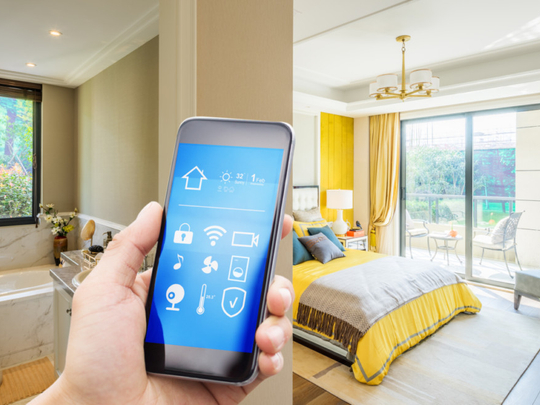
Smart home automation technology is growing around the globe, promising homeowners easy ways to monitor and be in control of their homes in a seamless fashion, while also making them safer and more energy efficient.
This is no different in the UAE, where smart home technology has developed at a rapid pace over the past few years. “The UAE is an advanced and tech-savvy market that has actively adopted smart technologies across many industries, including the residential housing sector,” says Dilip Sinha, general manager of Honeywell Environmental and Energy Solutions in the Middle East, Turkey and Africa.
Part of the reason for this is the fact that Dubai has a vision to become a “smart” city by 2021; smart homes play a vital role in reaching this goal.
Consequently, “we are seeing increasing demand for home automation solutions, which is in line with the pipeline of residential projects currently under development,” says Sinha.
Furthermore, over the past years, we have also seen a change in the type of product offering coming from property developers.
In the past, developers were only providing smart home-ready projects with the necessary containment and cabling in place; the customers then had to choose the systems they want to install, explains Leon Beuyukian, founder and managing director of Novus Automation in Dubai.
Today however, developers already integrate home automation systems at the property’s developing stage and sell the finished product with fully functional smart home systems, adds Beuyukian.
What is home automation?
Basically, home automation means that the home environment is able to adapt to its owner’s needs all by itself. It can control blinds and curtains, lighting, air conditioning as well as doors and access points, even before the owner has entered the room or the building itself. Home Automation works via a combination of sensors, intelligent switches, universal remotes and smart mobile devices that connect to the internet and with each other. It reduces human intervention and allows the control of complicated tasks at the touch of a finger.
Various interconnecting home subsystems are currently present in the regional market such as lights, locks, thermostats, garage doors and security systems, explains Sinha. Responding to increased market demand in the UAE, Honeywell has recently launched a new home automation solution for premium villas and apartments. It provides occupants with full control over elements that impact both their comfort and security. “This includes the ability to control air conditioning, lighting, window curtains, power sockets, locks and garage doors, and security systems including indoor and outdoor CCTV systems,” explains Sinha.
The solution is designed for greenfield residential projects and consists of multilevel architecture, including designer control modules that suit multiple décor options. “The solution has easily customisable control buttons, a simple navigation scheme with 360-degree panoramic images support and an app that can control all devices from within the villa or apartment.”
According to Honeywell, the technology will serve the region’s growing demand for connected home technologies, and is targeted at high-end real estate developers who are eager to offer end users advanced technology.
Among the latest gadgets, voice control is the new thing in smart homes, says Beuyukian. “With the Gafa [Google, Amazon, Facebook and Apple] coming into the sector with their home devices such as Amazon Echo, Google Home etc., consumers are interested in integrating voice control into their existing smart homes,” he says. Novus Automation is currently installing such solutions into two of its clients’ existing smart home systems.
In the UAE, the home automation solution most commonly requested is for control of lights, HVAC and curtain/shades, says Beuyukian. This is followed by audiovisual solutions for multiroom audio and video distribution. “Security and access control is also on the top list, despite the fact that we live in one of the most secure cities in the world,” he adds.
Risk versus benefit
As with any technology, there are limits to home automation. Experts, however, agree that the benefits by far outweigh the risks.
“Risk is predominant but can be limited,” says Beuyukian. “Technology failure is rapidly disappearing. Today’s market offers services allowing the technology to be monitored 24/7; device status is checked every 30 seconds and security risks are mitigated.”
One of the greatest advantages of a smart home is related to energy savings, experts say. There is also a psychological factor — home automation provides security and is offering peace of mind, Beuyukian says.
In the broader sense, the benefits of smart homes are that they constitute the fundamental building blocks of smart cities.
“They reap economic and environmental benefits, protect human life and building assets and, therefore, lay the foundations of a smart city,” says Sinha. “Moreover, smart cities focus on creating green, safe and productive structures and a connected home consisting of these integrated automated solutions contribute to these smart city goals.”
As Dubai advances with its goal of becoming the world’s smartest city by 2021 and people are integrating cutting-edge technology into everyday life, the future of the intelligent homes market looks promising.











